5 Pillars of un-selfish self-love
The term self-love has become popular and sounds really good – but what does it look like in everyday life? And wouldn’t self-love mean that selfishness is just around the corner? What if I don’t know exactly how to practice self-love?
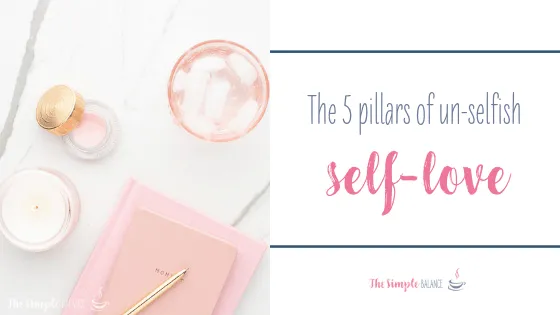
In this article, I’ll show you the 5 pillars of self-love. By keeping an eye on these 5 exercises, self-love will automatically become a part of your life. There’s not enough yoga in the world to make up for neglecting these fundamental steps of self-love.
No time for the whole article? Find the summary in this video:
Why self-love?
Self-love and self-care belong together like joy and laughter. One is the expression of the other. Self-care is the natural consequence of a healthy appreciation of yourself.
Psychology Today nailed it when, in this article, they said: ” Self-love is not simply a state of feeling good. It is a state of appreciation for oneself that grows from actions that support our physical, psychological and spiritual growth.”
Lack of self-care and self-love causes stress – find out more about the 33 effects of stress on the body.
What about selfishness?
When it comes to self-love, my biggest concern was becoming a selfish person. But self-care has nothing at all to do with selfishness. True selfishness manifests with a lack of empathy and a sole focus on personal interests. And these are pursued without much consideration for the needs of others.
I think it’s safe to say that a truly selfish person is unlikely to read an article about self-love so you’re good … ?
But how can you practice self-love? How can you learn to respect and value yourself as a person, as you often do instinctively with your favorite people?
Practical steps of self-love in everyday life
Instead of looking for fuzzy feelings in front of the mirror, there are tangible steps you can take to practice self-love. These steps are necessary for any self-care to really succeed.
You can never do enough yoga to make up for a lack of these five pillars.
So, let me show you how to take your self-care to the next level:

#1 Set boundaries
This step requires knowing what is good for you and what is not. If you have never thought about it, write down the answers to the following questions:
Exercise:
- What are the things you truly enjoy in life?
- Which activities make you feel alive, full of energy, and being yourself?
- What is it that you never have to force yourself to?
- Which activities can you never get enough of?
- And what (or who) drains your energy?
- Which situations (or people) exhaust very quickly?
- What irritates and annoys you?
- What do you have to force yourself to do?
The tricky part is that we’re not just talking activities. This especially concerns the people in your life. As a rule, you should first and foremost spend your time with people who love and encourage you.
And then set boundaries.
Reduce the things in your life – and the time you spend with people – that drain your energy and leave you feeling completely exhausted. Give priority to activities and people that are really good for you and recharge your batteries.
I know it’s easy to simply shrug your shoulders and say „There’s no way I can do this”. But let me encourage you with this quote by Nelson Mandela to give it your best shot:
It always seems impossible until it’s done.
Nelson Mandela
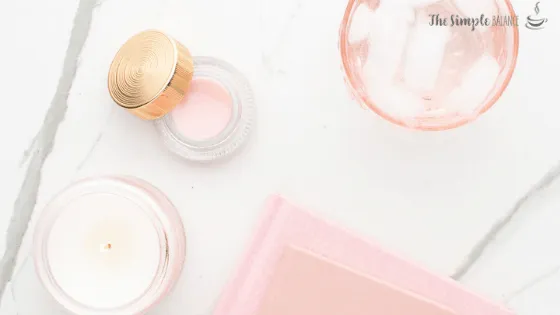
#2 Say no
The best exercise to set boundaries has only two letters: N-O
And unlike what you might think, “no” is a complete answer. You don’t have to explain or apologize.
You don’t like noisy and crowded places? Then say no to the festival invitation. All you need after a busy day is peace and quiet? Say no to meeting people after work. A person demands more time and attention than you feel comfortable giving? Say no.
Practice saying no
I know it’s hard to say no. And it’s particularly difficult when you’ve been trained from an early age to always be there for other people. Or when you were taught (explicitly or between the lines) that your needs are not as important as other people’s needs.
So practice saying no. Practice it at home in front of the mirror. Write the WhatsApp text a few times as a note to yourself. Create your own template answers to common requests. You know, the ones where you repeatedly fall into the I-said-yes-but-actually-meant-no trap…
As you start practicing your no, you may feel under pressure to explain yourself. And that’s okay. If it makes you feel better, use an excuse for now. Just avoid details and slowly work yourself up to a “Sorry, but no”.
If someone questions your no with a why
We all know the kinds of people that don’t accept a simple no. If this is the case, then keep your answer short and sweet:
- “I’m sorry, I can’t.”
- “I’m busy that day.”
- “I have a lot going on right now.”
- “I already have plans.”
Almost 20 years ago I learned something from my therapist that changed my entire perspective:
Just because there’s still a gap in my planner at that particular time doesn’t mean “I am available”.
You don’t have to be booked back to back to be able to say „I don’t have time”. Which is also why it’s not a lie to say you’re busy.
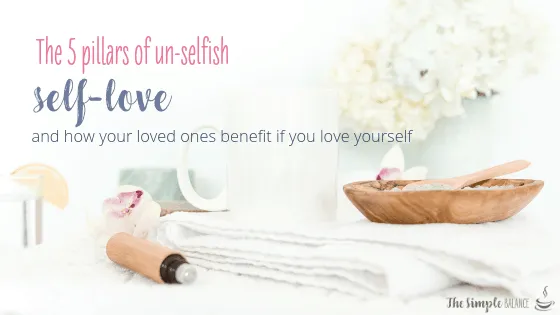
#3 Delegate
The third practical step of self-love is delegating. Just because you are able to do something doesn’t mean you have to do it yourself.
Practice self-love by preventing and actively reducing excessive demands Instead of picking up everything that lands in your lap, sort it out carefully.
Exercise:
Categorize all of your tasks according to the following criteria:
- What is important and can only be done by me?
- Which things are less important, but can only be done by me?
- What is important but can be done by others?
- Which things are less important and can be done by others?
In the future, top priority will be given to important tasks that you can only do yourself. Anything less important can wait. Everything else can be delegated or even scrapped.
But what does delegating look like in everyday life?
The dishwasher has to be emptied? Let your kids take care of it. The house needs to be cleaned? Make it a project for the entire family – or consider hiring someone to clean. You need to cook? Even children can be taught how to prepare simple meals. Or consider ordering a recipe box for a few meals each week.
There is yet another dimension of delegating that is easily overlooked: Delegate some of your cooking chores to a company that does it well.
That doesn’t have to mean eating processed food all the time, though:
- Stock your freezer with frozen vegetables which means you delegate washing, peeling and chopping.
- Instead of making and freezing your own vegetable puree for cooking, buy pure vegetable puree from the baby food section.
- Use cleaned and cut vegetables such as shredded cabbage, salad in a bag or ready-to-eat snack vegetables.
- Buy already chopped, frozen onions to reduce the hurdles in everyday cooking.
- Look for products made from the same ingredients you would use for cooking.
These tips seem small, but they are a huge help when feeling exhausted. As long as cooking is pure pleasure for you, there’s no need to pay the slightly higher price for such products. However, these examples are a great way to practice self-love if you are overwhelmed yet still want to cook with fresh ingredients.

#4 Kiss perfection good-buy
My biggest obstacle to delegating is that delegated tasks aren’t usually done exactly the way I’d do them. Followed by the trouble I’m giving myself by setting perfection as the standard for what I do.
But perfection is really a buzz-kill.
Life becomes unnecessarily complicated, exhausting and difficult. By expecting perfect outcomes, we stand in the way of ourselves and others – and miss the beauty of imperfection.
One of the basic rules of the universe is that nothing is perfect. Perfection simply doesn’t exist…..Without imperfection, neither you nor I would exist.
Stephen Hawking
Self-love through imperfection
On The Simple Balance, you find lots of inspiration for how to do things naturally. DIY cleaners and easy recipes made from real ingredients.
But as much as I like to avoid unnecessary ingredients in conventional products, the desire for natural alternatives must never cost my mental health. As soon as all the natural, homemade alternatives become stress factors, it’s time to take a step back.
Colourful instead of black and white
Rather than going for the all-or-nothing of perfection, pick and choose what works for you. Kiss perfection good-buy even when it comes to healthy living, particularly when it causes stress.
So think about where you make your life harder than it needs to be. Practice self-love by freeing yourself and others from the burden of perfection – and experience a new lightness.

#5 Equality of needs
The fifth pillar of self-love is more about a hidden, subconscious thought pattern that seems to strike moms the hardest: We’ve been so conditioned to meet others’ expectations and needs, that our own end up at the bottom of our priorities:
Only when everything else is taken care of, self-care starts being an option. We don’t dare to think of our own needs until everyone else’s are met.
But this hidden martyrdom demands a high price:
- overburdened, stressed out women are much less able to actively and happily participate in family life
- the quality of life sinks
- frustration, resentment, self-pity and bitterness grow and flourish
- chronic stress leads to elevated cortisol levels, which in turn leads to a compromised immune system, obesity, and other stress-related illnesses
- an imbalanced stressed-out mom affects the entire family
You might also like:
37 Easy self-care tips for busy days
The most important self-care tip for your mental health
Practice self-love out of love for other people
There’s one thing that often gets lost in the self-love conversation:
Taking your own needs seriously is proof of your love for your favorite people. There’s a saying that if mom is doing well, the kids are, too – that’s how much your own well-being affects your family.
Humans like many other animals are equipped with fine sensors to pick up on our loved ones’ well-being. We are able to notice unspoken things.
Ever walked into a room and instinctively knowing there’s “thick air” in a room, even though everyone looked friendly? Or have you ever met a person whose good mood simply swept you away?
This is exactly the way our children perceive if we’re not doing well. Let’s not kid ourselves by thinking that stress is only a personal problem.
Same-level needs
Therefore, all steps of self-love are also signs of love for your favorite people. Your own needs are equal to the needs of all family members.
Not all the needs of every family member can always be met immediately and fully. This is part of family life. But your own needs as a mom must not come second to all other needs.

Self-love as a role model
I am convinced that mothers who prioritize self-love make a big difference in their children’s lives. Not only because they are better able to face the demands of everyday life.
And not only because as a balanced mother, you are better able to guide your children into adulthood.
Probably the greatest blessing for your children is setting an example.
Because by practicing self-love and taking care of your own needs, your children learn the following valuable lessons:
- Other people have their limits and they need to be respected.
- Having boundaries is normal, okay and they need to be protected.
- Their own needs are important and equivalent to those of other people.
- In healthy relationships, different needs are being met so that everyone is well.
Self-love long-term consequences for your kids
This example of yours will leave your children well prepared for life, living in fulfilling relationships as adults. At the same time, you empower them against abuse of any kind – which is essentially nothing but a massive overstepping of boundaries.
In addition, their sensor for healthy relationships is calibrated in such a way that they can more easily recognize and leave abusive or toxic relationships.

Practice self-love
So don’t wait any longer. Start now by taking your first step towards self-love. Think about which of these five pillars you can apply right away.
You’re not just doing this for yourself, but just as much for your loved ones.
Start practicing self-love today – and self-care will become much easier.
Ready to get more balance into your life? Sign up for my newsletter and gain access to my soon-to-be growing VIP area!

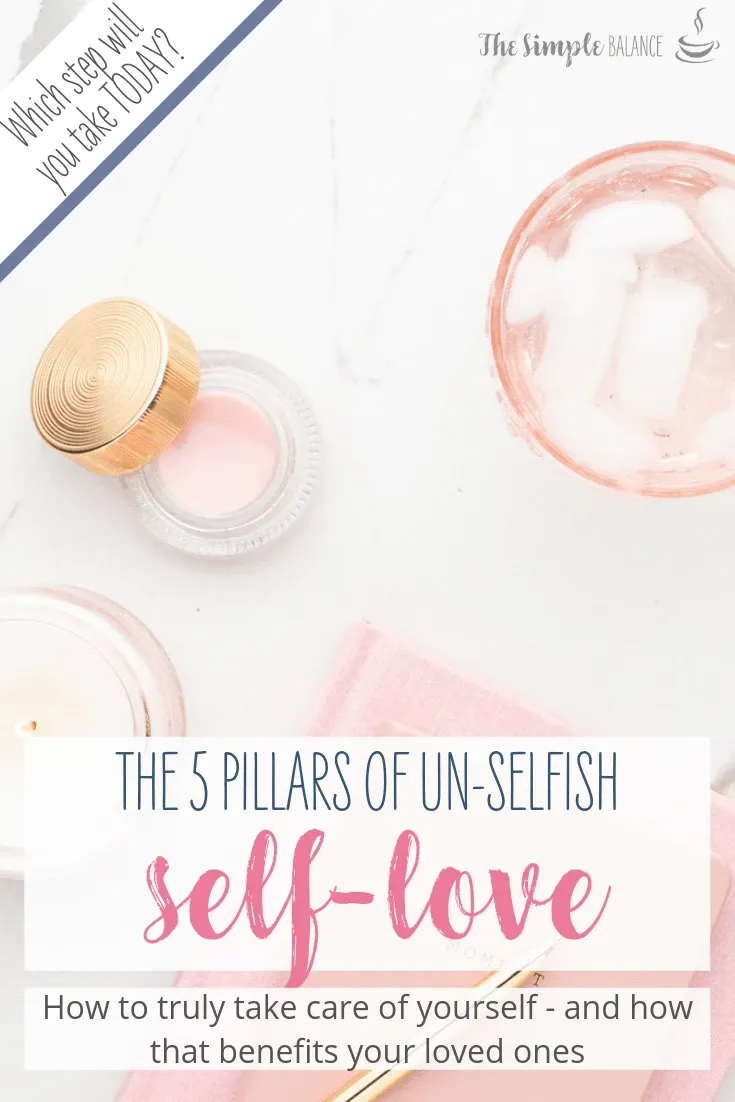
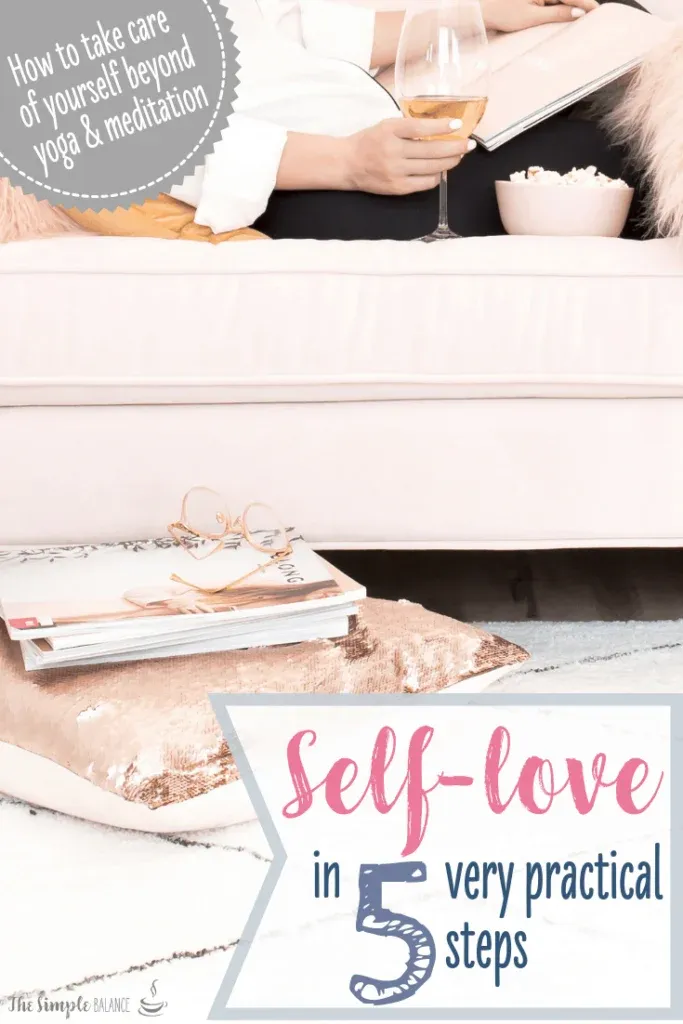

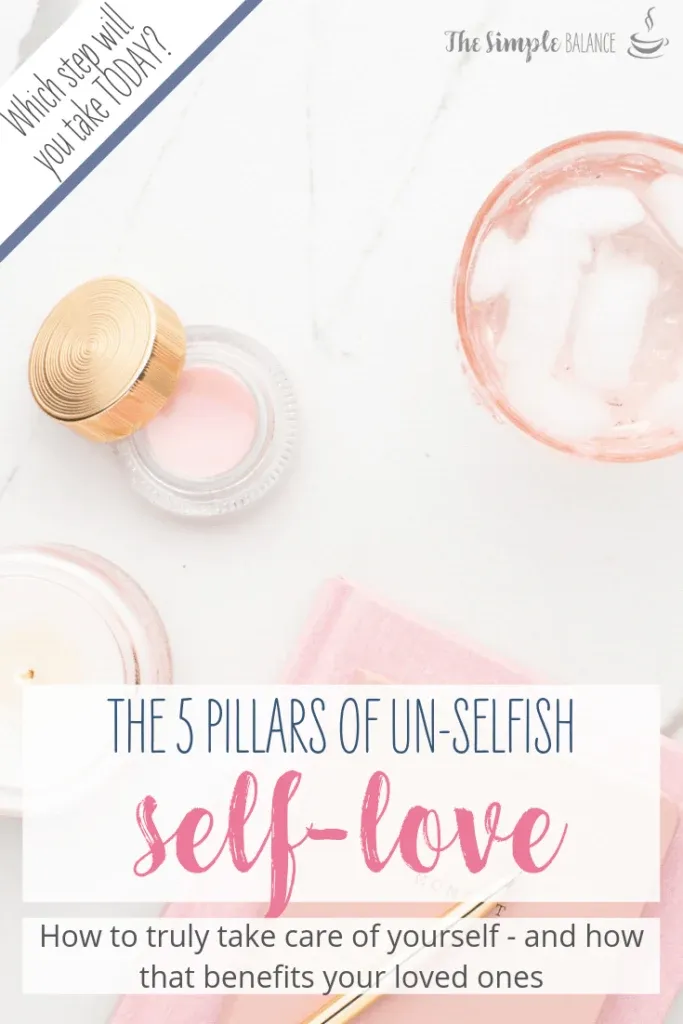
Leave a Reply